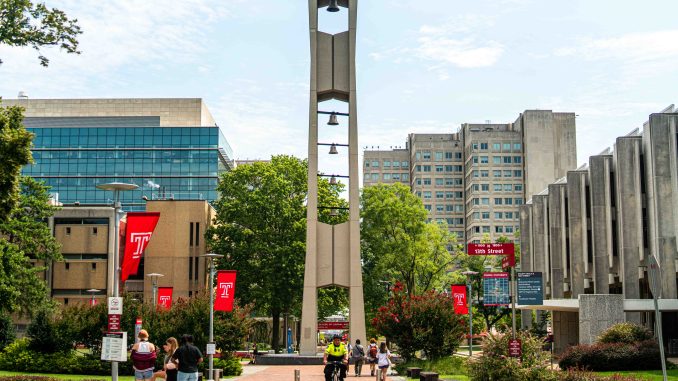
The Department of Education Office for Civil Rights opened a Title VI investigation into Temple last month to look into the alleged harassment of Jewish students and alleged neglect from the university in protecting these students.
Temple is one of at least 30 universities to be on the receiving end of a shared ancestry discrimination investigation since Oct. 7, the start of the latest Israel-Hamas war. Title VI of the Civil Rights Act prohibits discrimination based on race or national origin. Temple legally must comply with Title VI as a public university that receives federal financial assistance.
Both the OCR and the university are unable to comment on an ongoing investigation. Here’s what to know about the investigation based on publicly available information about the complaint and online resources about DOE’s case processing methods.
WHAT’S HAPPENING NOW?
A valid complaint requires an explanation of the discrimination that occurred, an identified person or group who was injured by the discrimination and the school responsible. It cannot be an undocumented, oral allegation or anonymous correspondence, and it has to have occurred during the last 180 days since the complaint was filed.
A case can involve multiple parties but focuses on resolving the complaint between the complainant and recipient: Zachary Marschall and Temple respectively in this case.
Marschall is the editor-in-chief of Campus Reform, a conservative college news site focused on exposing “liberal bias.” He alleged protests held or participated in by Temple’s Students for Justice in Palestine chapter, which featured “From the river to the sea, Palestine will be free” and “Intifada revolution” chants, supported the “expulsion” or “genocide” of Jewish Israelis.
Marschall also alleged that he has spoken to “numerous Jewish students across the country” who feel unable to take action themselves.
The OCR was likely able to begin the investigation because local news outlets publicly recorded the chants, which Marschall cited in the complaint. The office stated in its letter to Marschall that it will investigate “whether the university failed to respond to alleged harassment of students,” according to Campus Reform.
The office often interviews relevant faculty or students in investigations to corroborate allegations.
“We are aware of the Department of Education investigation and are fully complying with their requests by providing our policies, procedures and detailing the supportive resources we offer to our community,” the university wrote in a statement to The Temple News.
Temple published an Israel-Gaza Crisis resource page and offered emotional support for affected students through IDEAL’s Interfaith Inclusion Center. The university said it also receives guidance from the Blue Ribbon Commission on Antisemitism. These resources could demonstrate that the university provides sufficient support for Jewish students in the investigation.
WHAT COMES NEXT?
A complaint can be dismissed or closed if the office receives credible information that the situation has been settled between the two parties and that there is no systemic discrimination.
Otherwise, the complaint can be resolved as having “insufficient evidence” or being “non-compliant” with Title VI. There could also be a “mixed determination,” which is relevant in complaints like Marschall’s with multiple instances of discrimination.
If there is insufficient evidence, the OCR will resolve the complaint with a letter to both parties detailing the office’s findings.
If the university is found non-compliant with Title VI, the office will propose a resolution agreement that would address both the individual instance of discrimination and any systemic discrimination and the university will be contacted to negotiate the resolution.
The OCR would proceed with administrative enforcement or judicial proceedings if the university doesn’t comply with the resolution agreement.
After the office proposes a resolution agreement, the OCR and the university have a negotiation period of 30 days to reach a final agreement on the actions the university will take. If an agreement is not reached within this timeframe, the OCR resumes its investigation and the negotiations may continue.
Once a resolution agreement is proposed, the university has 90 days to sign the final agreement.
The OCR would monitor the university’s compliance with the resolution agreement and close the case when it determines its completion.
Previous shared ancestry discrimination complaint resolutions have often ended with a mandatory university statement on the type of discrimination the institution is found to have perpetuated. If applicable, staff training on discrimination or disciplinary action against the parties held responsible may also be required.
If Temple is found non-compliant with Title VI, due to the nature of the complaint, the university would at least be held accountable to make a public statement.


Be the first to comment